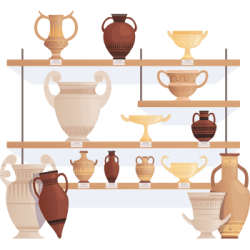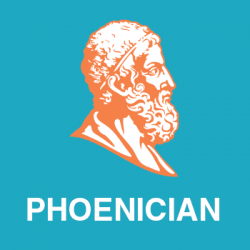English To Phoenician Translations

English to Phoenician
When people become passionate about something, they abandon all logical thoughts. No one spends hours building a Lego castle because it will bring them any monetary benefits. People don’t go to the movies every night because they have no better use of their time. Many people do things to pass their time or to make money on the side. But when someone has a passion, it becomes instantly clear that they follow a certain path for their heart’s satisfaction. They don’t care if it wouldn’t be beneficial for them. The study of history can indeed help us with devising better plans for the future. But the people who study history only do so because they are passionate about learning about ancient civilizations.
Is Phoenician a Dead Language?
There are many people in this world who study linguistics, but only a few focuses on dead languages. Our world is constantly evolving, and, in that process, many things of the past have become extinct. There are many cultures and civilizations of the past that we have only learned about because of the constructions they left behind. Similarly, there are many languages that we have learned through ancient scripts and inscriptions on tombs.
How many languages are dead?
It is impossible to know exactly how many languages are dead or extinct. Many languages were spoken long before humans had a system for documenting them. We have no written record of most of the ancient languages. Latin, Coptic, Sumerian, and Akkadian are few dead languages that we know of.
What are examples of dead languages?
The perfect example of a dead language is Latin which has no native speaker but is still in use in some ways. Sanskrit is another dead language because it is not the native tongue of anyone in the world. It is still spoken by a few people in India. Latin and Sanskrit are perfect examples of dead languages because despite not having native speakers, they continue to have a presence in the world.
What is the oldest dead language?
According to archaeological data, the oldest dead language of the world is Sumerian. The oldest proof of written Sumerian dates back to at least 3500 BC. The written proof of Sumerian was found in modern day Iraq on the Kish Tablet. The artifact has proved the position of Sumerian as the oldest dead language.
Is Greek a dead language?
Although Greek is still spoken in the world, it is different from the Ancient Greek in which the famous Greek philosophers shared their ideas. The Ancient Greek is a dead language. It was a very powerful language and contributed greatly to various fields of study. But it has no native speakers in today’s world.
What language did the Phoenicians speak?
The Phoenicians speak a Semitic language known as Phoenician. Due to the commercial dominance of the Phoenicians, their language became the lingua franca of the maritime Mediterranean. During the Iron Age, the Phoenician language was spread to Greece. The Phoenician alphabet is considered the partial ancestor of all of the modern alphabet.
Is Phoenician a dead language?
Phoenician is not a dead language; it is an extinct language. A dead language is one that does not have any native speakers left but is still in use, like Latin. Phoenician, on the other hand, is not spoken by anyone as their primary or secondary language. Fortunately, we know enough about its alphabet, which is why the language is not completely lost.
What was the Phoenicians writing system called?
The Phoenician’s writing system was called the Phoenician alphabet. It was a phonetic alphabet. It is believed to be the partial ancestor of almost all of the modern alphabets. Languages including Hebrew, Ammonite, and Phoenician were written in the Phoenician alphabet. Early Greek alphabets, Aramaic script, and various Anatolian scripts were some of the earliest writing systems that were derived from the Phoenician alphabet.
Why is the Phoenician alphabet important?
The Phoenician alphabet was used to write various Canaanite languages including Hebrew and Phoenician. It is believed to be the partial ancestor of almost all of the modern languages. Studying it can give us a better understanding of the modern scripts and writing systems. It can also tell us something about the future languages and what their alphabets will look like.
The Phoenician Language:
A distant cousin of Hebrew, Phoenician, was once spoken in various regions. The majority of its speakers were the inhabitants of Greater Syria. Studies suggest that it was in use from the 11th century BCE to the 2nd century CE. Despite being so influential, the Phoenician language became extinct. The Phoenicians are known as the first people to teach others how to write. They used papyrus to write their language on, but unfortunately, most of those texts were lost. However, the Phoenician tongue reached us through various inscriptions, which is why linguists know its alphabet.
Almost ten thousand inscriptions have survived Phoenicians, but not many of them have proven helpful to linguists. But they did show us the complexity of this ancient language. The alphabet and the writing system of the Phoenicians were pretty complicated. Experts have yet to crack the working of the vowels in this ancient tongue. Despite the complexity, people still study the language. Many experts are still trying to figure out the working of Phoenicians. But one thing is for sure, reading the inscriptions in such an ancient tongue is bound to make you feel surreal.
English to Phoenician Translation:
Many people in the world would do anything to get that surreal feeling. They will even go to the extreme of learning an ancient tongue that won’t do them any good in today’s world. However, it is good for our souls to do things for pleasure, not just for monetary benefits. But not everyone can study an ancient tongue. Some people don’t have the time or resources to accomplish such a feat. However, they may require the translation to or from such an ancient tongue for one reason or another. But what should a person do if they require the translation of Phoenician, a language that has been dead for many centuries?
English to Phoenician Letter
Whether you plan to get a letter translated to Phoenician for your friend who is obsessed with the language or wants to understand an ancient inscription, you can’t get help from the internet. You will have better chances of finding translations of fictional languages. And unfortunately, there are no native speakers of Phoenicians today, so you can’t even rely on their help for linguistic services. However, some companies understand people’s needs and, therefore, offer linguistic services for all languages. They don’t care if the tongue whose translation you require has been dead for a few decades or many centuries; if you require linguistic assistance, they will be ready to offer you the right solution.
Such agencies care about the needs of their clients, and that’s why they can be trusted to provide you with the kind of service you require. They hire only the best translators so their clients won’t have any problems. Their teams are made up of highly qualified experts of all languages. When you need help with an ancient tongue, you should not hesitate to contact a reputable agency because they will be the only ones who can help you.
The world is moving forward pretty quickly, but it is important to remember where we came from. If we continue to believe in our roots and stay connected to the past, we will face the future with more dignity. We can’t learn from our mistakes if we don’t acknowledge them. Studying history, ancient cultures, and languages are one way of connecting with the past. And if you need the assistance of a professional to help you understand an ancient tongue, don’t hesitate to reach out to the right agency.






